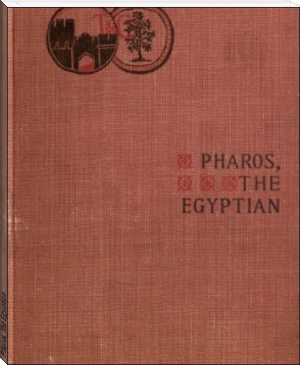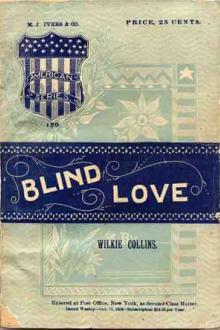Pharos, The Egyptian - Guy Boothby (motivational novels .TXT) 📗

- Author: Guy Boothby
Book online «Pharos, The Egyptian - Guy Boothby (motivational novels .TXT) 📗». Author Guy Boothby
Before I could reply or ask how he had become familiar with these details, he had made his way outside and was in the road once more. I followed him to the Street of Fortune, passed the House of the Fawn, the Baths, and the Villa of Glaucus. Of each he had some story to tell--some anecdote to relate. From the graphic way in which he described everything, the names and characters he introduced, I might have been excused had I even believed that he had known the city in its prime and been present on the day of its destruction. I said as much to him, but he only shook his head.
"Think what you please," he said. "If I were to tell you the truth you would not believe me. For that reason I prefer that you should credit me with the possession of an exceedingly vivid imagination. If I have succeeded in making the last hour pass pleasantly, I am amply rewarded. But it grows late; the guards are coming in search of us; let us return to the gate."
Accordingly, we made our way back to the Porta Marina, and down the path toward the entrance to the ruins. My companion was evidently well known to the officials, for they treated him with obsequious respect, bowing before him and inquiring if he had seen certain new excavations, as if the success of the latter depended entirely on his good opinion of them. In the road outside a carriage was standing, to which was attached a magnificent pair of black horses. A coachman, dressed in a neat but unpretentious black livery, sat upon the box, while a footman stood beside the carriage door. The whole turn-out was in excellent taste, and would have made a creditable appearance in the Bois de Boulogne or Hyde Park. Into this elegant equipage Pharos invited me to step, and as soon as I had seated myself he took his place beside me. Hot though the night was, a heavy fur rug was wrapped round his knees, and when this had been done he laid himself back upon the cushions with a sigh of relief, as if the exertion of the afternoon had been too much for him.
"So much for Pompeii," he said, as the horses sprang forward. "Now for Naples and the most beautiful creature it contains at present, my ward, the Fraeulein Valerie de Vocsqal."
CHAPTER VII.
If any one had told me on the night that I first met Pharos at the foot of Cleopatra's Needle that within a very short space of time I should be driving from Pompeii to Naples alone with him, I believe I should have laughed that person to scorn. And what is perhaps stranger, seeing how intense my dislike for him had been less than two hours before, I was not only paying attention to what he said to me, but was actually deriving a certain measure of enjoyment from his society. In my time I have met some of the cleverest talkers in Europe, men whose conversational powers are above the average, and to whom it is rightly enough considered a privilege to listen. Pharos, however, equalled if he did not exceed them all. His range of topics was extraordinary, and his language as easy and graceful as it was free from the commonplace. Upon every conceivable subject he had some information to impart, and in the cases of events in the world's history, he did so with the same peculiar suggestion of being able to speak from the point of an eye-witness, or, at least, as one who had lived in the same period, that I had noticed when he conducted me through the ruins of Pompeii that afternoon. The topography of the country through which we were passing he also had at his fingers' ends. About every portion of the landscape he had some remark of interest to make, and when we had exhausted Italy and proceeded to more distant countries, I found that he was equally conversant with the cities they contained. How long the drive lasted I can not say; but never in my experience of the high road between Naples and Pompeii had it seemed so short. Reaching the Castello del Carmine we turned sharply to our right, passed up the Corso Garibaldi for some considerable distance, and eventually branched off to the left. After that, I have no further knowledge of our route. We traversed street after street, some of them so narrow that there was barely room for our carriage to pass along, until at last we reached a thoroughfare that not only contained better houses than the rest, but was considerably wider. Before a large, old-fashioned residence the horses came to a standstill; a pair of exquisitely wrought-iron gates guarding a noble archway were thrown open, and through them we passed into the courtyard beyond. Beautiful as many of the courtyards are in Naples, I think this one eclipsed them all. The house surrounded it on three sides; on the fourth, and opposite that by which we had entered, was the garden, with its fountains, vista of palm trees, through which a peep of the waters of the bay could be obtained, and its luxuriant orange groves. In the soft light of evening a more picturesque picture could not have been desired.
The footman, having descended from the box, opened the door of the carriage, and when he had withdrawn the rug from his master's knees, assisted him to alight. I followed, and we proceeded up the steps into the house. Prepared as I was by the fact that both Lady Medenham and Sir George Legrath had informed me of Pharos's wealth, I could scarcely contain my surprise when the beauty of the house to which I was now introduced was revealed to me. The hall in which we stood was filled from floor to ceiling with works of art, carvings, paintings, statues, tapestry, the value of which I could the better appreciate when I was permitted an opportunity of examining them more closely.
"I make you welcome to my abode, Mr. Forrester," said Pharos, as I crossed the threshold. "You are not the first English artist who has honoured me with a visit, and I think, if you will glance round these walls, you will admit that you are in good company. See, here is a Fra Angelico, here a Botticelli, here a Perugino, to your right a Giorgione--all your fellow-guests. At the foot of the stairs is a Jan Steen, half-way up a Madonna by Signorelli; the monk above is, as doubtless you can see for yourself, an Andrea del Sarto, who has found many admirers. But that is not all. If you will follow me, I think I can show you something which will have an equal interest for you, though perhaps in a somewhat different way."
Feeling as if I were walking in a dream, I followed him along the hall. Presently he stopped and pointed to a large canvas.
"Do you recognise it?" he inquired.
To my surprise it was neither more nor less than one of my own earlier works which had appeared in the Academy about three years before and represented a fantastic subject. It had been purchased by a dealer, and after it had left my possession I had lost sight of it altogether. To find it here, in the home of the man who had come to play such an extraordinary part in my life, overwhelmed me with astonishment.
"You seem surprised at seeing it," said Pharos, as we stood before it. "If you will allow me I will relate to you the circumstances under which it came into my possession, and I think you will admit that they are highly interesting. It is now two years since the event occurred of which I am going to tell you. I was then in Baden. It was the height of the season, and the city was crowded, not only with interesting foreigners--if you will permit the unintentional sarcasm--but with a large proportion of your own English aristocracy. Among the latter was a certain nobleman to whom I was happily able to be of considerable service. He was one of life's failures. In his earlier youth he had a literary tendency which, had the Fates been propitious, might possibly have brought him some degree of fame; his accession to the title, however, and the wealth it carried with it, completely destroyed him. When I met him in Baden he was as near ruined as a man of his position could be. He had with him one daughter, a paralytic, to whom he was devotedly attached. Had it not been for her I am convinced he would have given up the struggle and have done what he afterward did--namely, have made away with himself. In the hope of retrieving his fortune and of distracting his mind he sought the assistance of the gaming-tables; but having neither luck nor, what is equally necessary, sufficient courage, eventually found himself face to face with ruin. It was then that I appeared upon the scene and managed to extricate him from his dilemma. As a token of his gratitude he made me a present of this picture, which up to that time had been one of his most treasured possessions."
"And the man himself--what became of him?"
Pharos smiled an evil smile.
"Well, he was always unfortunate. On the self-same night that he made me the present to which I refer he experienced another run of ill luck."
"And the result?"
"Can you not guess? He returned to his lodgings to find that his daughter was dead, whereupon he wrote me a





Comments (0)